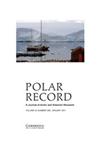International interdisciplinary Arctic research: Case study of the Russian Arctic biomonitoring mega-grant project
IF 1.6
4区 环境科学与生态学
Q3 ECOLOGY
引用次数: 0
Abstract
Abstract The Arctic region is commonly seen as a territory of international dialogue and cooperation. This perception is largely due to the science diplomacy efforts that are largely being contributed by universities, scientific centres, research teams and individual scholars. This paper discusses the Arctic science diplomacy initiatives proposed by Russia’s northernmost federal university. Of particular interest is the case of establishing in the Arctic Zone of the Russian Federation of national biological monitoring network – the initiative supported by the government-funded mega-grant programme. Our analysis suggests that two pillars of science diplomacy – “science for diplomacy” and “diplomacy for science” – can be successfully combined within the framework of one project. Evidence is provided of the pursuit of national interests being not a limiting factor but rather a driver in the process of promoting diplomatic collaborations in science, serving as a third science diplomacy pillar. Significant progress towards ensuring peace and harmony in the Arctic and sustaining international dialogue on science-based responses to global challenges has been achieved through science diplomacy initiatives proposed by Northern (Arctic) Federal University (NArFU). The authors confirm that most effective tools for establishing good neighbourly relations in the Arctic and promoting international cooperation are offered by scientific discussion.国际跨学科北极研究:俄罗斯北极生物监测大型资助项目案例研究
摘要北极地区通常被视为国际对话与合作的地区。这种看法在很大程度上是由于大学、科学中心、研究团队和个别学者所做的科学外交努力。本文讨论了俄罗斯最北端的联邦大学提出的北极科学外交倡议。特别令人感兴趣的是在俄罗斯联邦北极区建立国家生物监测网络,这一举措得到了政府资助的巨额赠款方案的支持。我们的分析表明,科学外交的两大支柱——“科学换外交”和“外交换科学”——可以成功地结合在一个项目的框架内。有证据表明,在促进科学外交合作的过程中,追求国家利益不是一个限制因素,而是一个驱动因素,是科学外交的第三支柱。通过北方(北极)联邦大学提出的科学外交倡议,在确保北极地区的和平与和谐以及维持关于以科学为基础应对全球挑战的国际对话方面取得了重大进展。作者确认,科学讨论提供了在北极建立睦邻关系和促进国际合作的最有效工具。
本文章由计算机程序翻译,如有差异,请以英文原文为准。
求助全文
约1分钟内获得全文
求助全文
来源期刊

Polar Record
环境科学-环境科学
CiteScore
1.40
自引率
25.00%
发文量
26
审稿时长
>36 weeks
期刊介绍:
Polar Record is an international, peer-reviewed scholarly periodical publishing results from a wide range of polar research areas. The journal covers original primary research papers in the humanities, social sciences, physical sciences, life sciences, and polar technology, as well as papers concerning current political, economic, legal, and environmental issues in the Arctic or Antarctic. Polar Record endeavours to provide rapid publication, normally within nine months of initial submission.
 求助内容:
求助内容: 应助结果提醒方式:
应助结果提醒方式:


